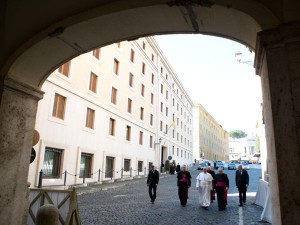
In this photo made available by the Vatican newspaper L’Osservatore Romano, Pope Francis walks on his way to the Paul VI hall, at the Vatican, Saturday, March 16, 2013. Pope Francis offered intimate insights Saturday into the moments after his election, telling journalists that he was immediately inspired to take the name of St. Francis of Assisi because of his work for peace and the poor, and was embraced by another cardinal amid applause inside the conclave. (AP Photo/L’Osservatore Romano, ho)
The Vatican Conclave’s election of the 266th Pope, the former Cardinal Jorge Bergoglio of Argentina, who has adopted the papal name Pope Francis after St. Francis of Assisi, provides new meaning to the season of Lent, which is being observed by all 1.2 billion Roman Catholics in the next two weeks.
Known as a man of simplicity and humility, Saint Francis of Assisi is also the patron saint of animals and the environment. In fact, St. Francis of Assisi’s feast day on Oct. 4 is celebrated with a blessing of animals.
If indeed, Pope Francis, the only non-European Pope in more than a millennium, intends to emulate St. Francis of Assisi, then simplicity and humility not only toward other human beings but also toward all of God’s creations—big and small—would be the order of the day not just for the new Pope, but for all Catholics.
And this should provide something for Catholics to reflect upon more deeply during the Holy Week. It is, after all, the only days of the year when the faithful is firmly requested to forego eating animals.
Lenten ‘sacrifice’
The spirit of St. Francis of Assisi, as lived by Pope Francis, places a deeper level of compassion to this Lenten “sacrifice” of the Catholic.
It is a sacrifice which, as more studies have pointed out, has turned out to be beneficial not only to our bodies, but to the environment as well.
The heart becomes “younger” when it isn’t exposed to fatty foods and animal products, explains nutritionist-dietitian Blecenda M. Varona, DrPH, MPH, RND. “We hurt our endothelium by eating fatty foods and animal products,” she explained.
Shunning meat also helps the environment to heal itself, and helps feed more hungry people. According to Frances Moore Lappe in “Diet for a Small Planet,” the production system that generates our grain-fed meat diet not only wastes our resources but helps destroy them. The meat-eating habits of the wealthy around the world support a world food system that diverts food resources from the hungry. According to Jeremy Rifkin in his book “Beyond Beef,” about a third of the world’s total grain harvest is fed to cattle and other livestock, while as many as a billion people suffer from chronic hunger and malnutrition.